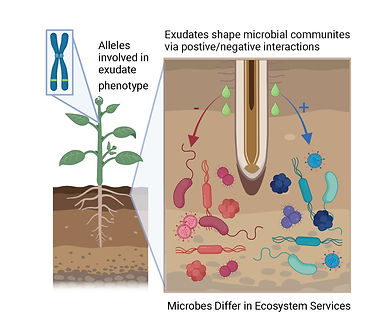
Microbiome Extended Phenotypes Lab

Research
Our lab investigates how complex microbial communities, often referred to as “Ecological Dark Matter”, both influence and respond to human activity.
Our central goal is to understand and leverage microbial interactions to enhance human sustainability and mitigate the ecological damage caused by anthropogenic systems.
Much of our research focuses on how modern agricultural practices have altered plant-microbiome associations and disrupted soil microbial communities. We aim to re-align human systems so they function symbiotically with the Earth's microbiome as a central part of that partnership.
We are particularly interested in the ecology and function of belowground bacterial and archaeal communities that regulate key biogeochemical cycles, including nitrogen, carbon, and water dynamics.
Our research broadly addresses the need to improve understanding of:
1. Plant genetic and mechanistic understanding of rhizosphere microbiome recruitment
2. Emergent ecosystem biochemical cycling consequences of plant-microbiome interactions
3. Incorporation of soil microbial ecology understanding in agriculture to improve sustainability and reliance in the face of global change
4. Characterize microbial trade-offs that potentially hinder the harnessing of the soil microbiome
To address these questions, we use a combination of multi-omic interdisciplinary approaches that span microbiology, plant genetics, modeling, and ecosystem ecology. We hope that this expanded toolkit will allow us to translate plant-microbiome interactions at ecologically important interfaces.
The toolkit developed in the lab will include microbiome amplicon sequencing, metagenomic sequences, transcriptomics, metabolomics, enzyme assays, plant genetics, culturing, and gas chromatography. Really, any method that helps with understanding complex microbial communities.


The primary goal of the lab is to generate knowledge to improve how we select for plant varieties, soil microbial communities, and agricultural management practices. We want to incorporate mechanistic insights into microbial ecosystems to achieve and develop solutions that improve symbiosis with the plant (i.e., functional sustainability).
Research Themes
